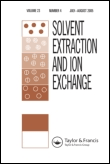
SOLVENT EXTRACTION AND ION EXCHANGE
Scope & Guideline
Exploring Innovative Solutions in Extraction and Exchange
Introduction
Aims and Scopes
- Solvent Extraction Techniques:
The journal emphasizes innovative solvent extraction methods, including liquid-liquid extraction, supported liquid membranes, and advanced extraction processes for various metal ions and compounds. - Ion Exchange Processes:
Research articles often explore ion exchange methodologies, detailing their application in environmental remediation, resource recovery, and waste management. - Characterization of Extractants and Resins:
A significant focus is placed on the development and characterization of new extractants, resins, and materials designed for enhanced separation efficiency and selectivity. - Environmental and Industrial Applications:
The journal addresses practical applications of solvent extraction and ion exchange in industry and environmental contexts, including nuclear waste management, resource recovery, and pollution control. - Theoretical and Computational Studies:
Articles also include theoretical investigations and computational modeling studies that aid in understanding extraction mechanisms and improving process design.
Trending and Emerging
- Green Extraction Techniques:
There is an increasing emphasis on green chemistry principles, with research exploring environmentally friendly solvents and processes that minimize waste and energy consumption. - Recovery of Critical Metals:
A significant trend is the focus on the recovery of critical and rare earth metals, driven by their importance in modern technology and sustainability initiatives. - Advanced Materials for Extraction:
Emerging studies are dedicated to the development of novel materials, such as functionalized polymers and ionic liquids, which enhance extraction efficiency and selectivity. - Complex Matrix Processing:
Research is increasingly addressing the challenges of extracting valuable metals from complex matrices, including industrial waste and natural resources, highlighting the need for innovative separation strategies. - Integration of Computational Techniques:
The incorporation of computational methods, such as molecular dynamics and simulation studies, is gaining traction, providing deeper insights into extraction mechanisms and optimizing process conditions.
Declining or Waning
- Traditional Solvent Extraction Methods:
There is a noticeable reduction in publications focusing solely on traditional solvent extraction methods, as newer, more efficient techniques gain prominence. - Conventional Ion Exchange Materials:
Research on conventional ion exchange materials is becoming less frequent, with a shift towards more advanced and functionalized materials that offer improved performance. - Single Metal Extraction Studies:
Studies concentrating on the extraction of single metal ions without considering mixed metal systems or complex matrices are less common, indicating a trend towards more comprehensive extraction studies.
Similar Journals
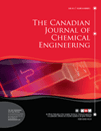
CANADIAN JOURNAL OF CHEMICAL ENGINEERING
Advancing the Frontiers of Chemical EngineeringCanadian Journal of Chemical Engineering, published by Wiley, stands as a pivotal platform in the field of chemical engineering, addressing a myriad of topics essential for researchers, professionals, and students alike. With ISSN 0008-4034 and E-ISSN 1939-019X, this journal has been a cornerstone of chemical engineering scholarship since its inception in 1958 and continues to provide valuable insights through its rigorous peer-reviewed articles. The journal is ranked in the Q2 category of the Scopus quartile rankings, reflecting its influence and relevance within the chemical engineering community, with a notable position of #137 out of 273 in the general chemical engineering field. Although it does not offer open access options, its comprehensive coverage of contemporary research and applications solidifies its status as a vital resource for advancing knowledge and innovation in chemical engineering.

Separations
Unveiling Breakthroughs in Analytical and Separation TechniquesSeparations is a prestigious open-access journal published by MDPI, dedicated to advancing the fields of analytical chemistry and filtration and separation processes. Established in 2014, the journal has swiftly emerged as a significant platform for disseminating groundbreaking research and innovative methodologies in separation science, boasting an impressive E-ISSN of 2297-8739 and operating out of Basel, Switzerland. With its focus rotating from 2016 through 2024, Separations has been categorized in the Q3 quartile for both analytical chemistry and filtration and separation disciplines as of 2023, demonstrating its relevance in these scientific areas. The journal's rankings in Scopus, with 93rd out of 156 in analytical chemistry and 15th out of 19 in chemical engineering filtration and separation, reflect its commitment to high-quality research accessible to a global audience. Researchers, professionals, and students will find valuable insights and pioneering findings that foster collaboration and innovation within the vibrant community of separation science.

Fuentes el Reventon Energetico
Bridging Theory and Application in Energy and ChemistryFuentes el Reventon Energetico, published by UNIV INDUSTRIAL SANTANDER, stands as a significant open-access journal since 2003, dedicated to the diverse fields of energy research and physical and theoretical chemistry. Based in Colombia, this journal aims to facilitate the dissemination of innovative research findings and emerging trends within these dynamic sectors. With an impressive academic foundation highlighted by its Q4 rankings in both energy (miscellaneous) and physical and theoretical chemistry as of 2023, the journal seeks to support both budding and established researchers in their quest for knowledge, fostering interdisciplinary collaboration. While its Scopus rankings place it within the lower percentiles in its categories, the journal remains committed to enhancing its visibility and impact through accessible publication of scholarly work. By bridging gaps between theory and application, Fuentes el Reventon Energetico plays an essential role in advancing energy solutions and innovative chemical applications, making it a valuable resource for researchers, professionals, and students alike.
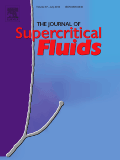
JOURNAL OF SUPERCRITICAL FLUIDS
Transforming Theoretical Concepts into Practical ApplicationsThe JOURNAL OF SUPERCRITICAL FLUIDS, publishing since 1988 and represented by Elsevier, stands as a pivotal platform for research in the dynamic fields of chemical engineering, condensed matter physics, and physical and theoretical chemistry. Located in the Netherlands, this esteemed journal focuses on the development and application of supercritical fluid technology, exploring its implications across diverse scientific disciplines. With impressive rankings, including Q2 in multiple categories, the journal reflects a strong commitment to advancing knowledge and innovation, thereby establishing its significant impact in the scientific community. Though not an open-access publication, it provides options for authors to ensure the visibility and reach of their work, appealing to researchers, professionals, and students alike. The JOURNAL OF SUPERCRITICAL FLUIDS continues to be a crucial resource for those dedicated to enhancing the understanding of supercritical fluid phenomena, fostering collaboration and inspiration among academics and practitioners worldwide.

Mineral Processing and Extractive Metallurgy-Transactions of the Institutions of Mining and Metallurgy
Transforming Knowledge into Mining ExcellenceMineral Processing and Extractive Metallurgy - Transactions of the Institutions of Mining and Metallurgy is a premier journal published by SAGE Publications Inc that aims to provide a dynamic platform for researchers, professionals, and students in the fields of mineral processing, extractive metallurgy, and related disciplines. With an ISSN of 2572-6641 and E-ISSN 2572-665X, this journal spans a diverse range of topics including geochemistry, geotechnical engineering, and the latest advancements in mining technologies. Currently classified in the Q3 quartile across various categories, it holds commendable rankings in Earth and Planetary Sciences and is recognized for its impactful contributions to the science of resource extraction. The journal accepts contributions from both theoretical and applied perspectives, fostering a multidisciplinary approach to mineral resource utilization. Researchers can access cutting-edge studies that break new ground in extraction techniques and processing innovations, enhancing the sustainability of mining operations. Since its inception in 2018, it has consistently attracted a global readership, making it an essential resource for those dedicated to advancing the fields of geology and metallurgy.

HYDROMETALLURGY
Empowering researchers to shape the future of hydrometallurgy.HYDROMETALLURGY is a premier journal dedicated to advancing the field of hydrometallurgical processes, published by Elsevier. Since its inception in 1975, it has become a vital resource for researchers and practitioners in the realms of industrial and manufacturing engineering, materials chemistry, and metallurgical science. With its impressive impact factor and ranking in the top quartiles of its categories, this journal consistently disseminates high-quality research and reviews that drive innovation in materials extraction and processing. The journal is essential for those involved in the development of sustainable metallurgical practices, sharing insights on cutting-edge techniques and applications in metal recovery and recycling. Although not an open access publication, HYDROMETALLURGY offers valuable access options, facilitating in-depth study and exploration of current advancements in the field. As it continues to bridge theoretical knowledge and practical application, researchers, professionals, and students alike are encouraged to contribute their findings and engage with the community.
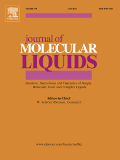
JOURNAL OF MOLECULAR LIQUIDS
Illuminating the Science of Molecular LiquidsJOURNAL OF MOLECULAR LIQUIDS, published by Elsevier, is a premier academic journal focused on the intricate nature of molecular liquids, spanning foundational to applied research. With an ISSN of 0167-7322 and an E-ISSN of 1873-3166, this journal has established its significance in various fields, achieving Q1 rankings across atomic and molecular physics, condensed matter physics, and materials chemistry, among others, as of 2023. The journal’s broad scope, covering studies from theoretical frameworks to experimental applications, serves as a vital platform for disseminating innovative research findings while advancing our understanding of molecular interactions and dynamics. With a strong position in Scopus rankings and high impact factors, it is a trusted resource for researchers, professionals, and students alike, seeking comprehensive insights into molecular liquids. As a journal that thrives on pioneering energy, the JOURNAL OF MOLECULAR LIQUIDS is essential for anyone wishing to remain at the forefront of research in this dynamic field.
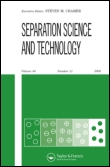
SEPARATION SCIENCE AND TECHNOLOGY
Exploring Breakthroughs in Chemical EngineeringSEPARATION SCIENCE AND TECHNOLOGY is a distinguished journal published by Taylor & Francis Inc, offering critical insights and advancements in the fields of chemistry and chemical engineering. With an ISSN of 0149-6395 and E-ISSN of 1520-5754, the journal spans a rich history from 1978 to 2024, providing a platform for scholarly articles that delve into innovative separation processes and technologies. Notably recognized in the 2023 category quartiles, the journal ranks Q2 in Chemical Engineering and Chemistry, alongside Q3 in Filtration and Separation and Process Chemistry and Technology, reflecting its significant impact and relevance in these research areas. With an impressive Scopus ranking, including a rank of #10/19 in Filtration and Separation, SEPARATION SCIENCE AND TECHNOLOGY is crucial for researchers and professionals seeking to enhance their understanding of separation techniques and applications. Although it operates under a subscription model, its contributions remain indispensable for the advancement of knowledge and technologies in separation science.

CHEMICAL AND PETROLEUM ENGINEERING
Pioneering Discoveries in Chemical and Petroleum SciencesChemical and Petroleum Engineering is a prestigious academic journal dedicated to the advancement of knowledge in the fields of chemical engineering and petroleum technologies. Published by Springer, this journal serves as a vital resource for researchers, professionals, and students interested in the intricate processes and innovations that drive these industries. With an ISSN of 0009-2355 and an E-ISSN of 1573-8329, it has established a notable presence since its inception in 1965. Throughout its converged years, the journal has continually published impactful research that contributes to sustainability and efficiency within the sectors. Although it holds a Q3 ranking in Chemical Engineering and Fuel Technology and a Q4 ranking in Energy Engineering and Geochemistry, it is a noteworthy platform for emerging studies, fostering connections among scholars. Readers will find a wealth of information and ideas, but please note that this journal does not currently offer open access options. For those passionate about chemical and petroleum engineering, this journal is an essential part of staying informed and engaged with the latest scientific advancements.

China Petroleum Processing & Petrochemical Technology
Unveiling critical advancements in chemical engineering.China Petroleum Processing & Petrochemical Technology is a critical journal published by the China Petroleum Processing & Petrochemical Technology Press, focusing on the pivotal advancements within the field of petroleum processing and petrochemical technology. With ISSN 1008-6234, the journal has been a significant resource since its inception in 1999 and aims to disseminate original research articles, reviews, and case studies that contribute to knowledge and innovation in energy engineering, fuel technology, and chemical engineering. Despite its current Q4 status in various quartile rankings, it provides essential insights and research that are invaluable for researchers, professionals, and students interested in these expanding areas. The journal is located in Beijing, China, and continues to strive for excellence in academia, encouraging contributions that address pressing challenges in the petroleum and petrochemical industries while fostering a deeper understanding of process chemistry and technology.